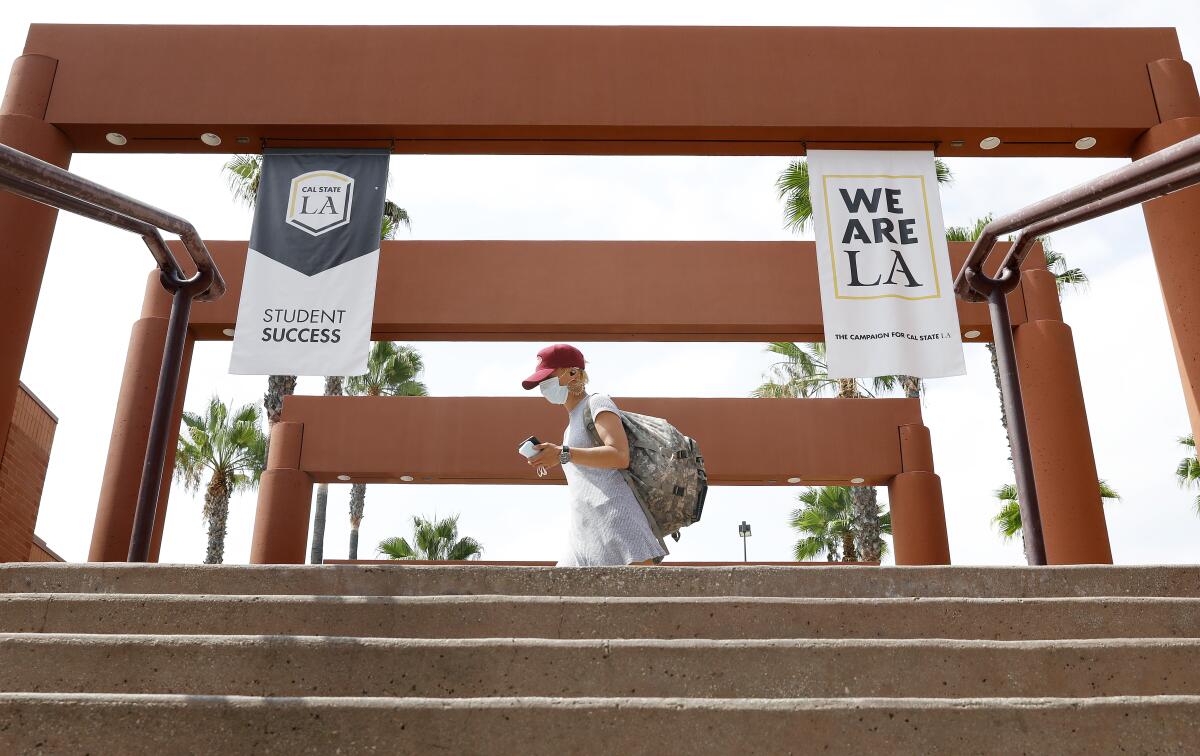CSU officially drops SAT and ACT from admissions process in major move

- Share via
Trustees of California State University, the largest four-year university system in the nation, agreed Wednesday to permanently drop the SAT and ACT standardized tests in its admissions process, solidifying the state’s national role in eliminating the high-stakes exams because of equity concerns.
The move comes after the University of California system led the way, making the bold decision in 2020 to drop the exams, triggering a national debate over whether the tests unfairly discriminate against disadvantaged students or provide a useful tool to evaluate college applicants.
The dual actions by California’s public university systems, which collectively educate 772,000 students, are likely to accelerate the national movement to reshape the college admissions process and craft more equitable ways to assess student readiness for higher education.
“Today’s decision ... sets a standard for public institutions around the country,” said Bob Schaeffer, executive director of FairTest: National Center for Fair & Open Testing. “Combined with the elimination of standardized exam mandates by the University of California system as well as test-optional policies in place at all public campuses in Oregon and Washington state, these actions make the West Coast a national model for admissions reform.”
But ACT criticized the trustees’ action, saying it was “more likely to harm than help students.”
“Abandoning the use of objective assessments like the ACT test introduces greater subjectivity and uncertainty into the admissions process, and this decision is likely to worsen entrenched inequities in California,” ACT said in a statement. “Solving the prevailing, systemic education inequities that exist in this country requires attention and focus on root causes, rather than dismissing the tools that substantially improve our understanding of them.”
The CSU decision follows a two-year suspension that aimed to decrease anxiety and limited access to the tests for applicants during the pandemic. The Cal State Student Assn. and the Cal State Academic Senate also supported the discontinuation of tests.
Trustee Yammilette Rodriguez said Tuesday that the decision is personally meaningful to her and that the push for equity will benefit many.
At a board meeting earlier this year, Rodriguez described how she attended a small rural school without the support to guide her pathway to college and missed SAT and ACT registration deadlines. She attended a community college, although she had a 4.0 GPA, instead of her preferred route to enroll directly in a four-year university.
“I am a product of the CSU — a proud product of the CSU — and I would have been a product even sooner if I could have gotten in as a freshman,” Rodriguez said Tuesday. “Because of the enrollment barriers that I faced, and lack of tools offered to me as a student, I wasn’t equipped to have entry into the CSU, but I know that my story is the same for many all across California.”
Acting CSU Chancellor Steve Relyea agreed, saying the move “aligns with the California State University’s continued efforts to level the playing field and provide greater access to a high-quality college degree for students from all backgrounds.” He added, “We are eliminating our reliance on a high-stress, high-stakes test that has shown negligible benefit and providing our applicants with greater opportunities to demonstrate their drive, talents and potential for college success.”
More than 1,800 colleges and universities — nearly 80% of all four-year U.S. campuses that award bachelor’s degrees — have already dropped standardized testing requirements for admissions. Most campuses, like Cal State’s, made the tests optional during the pandemic.
UC regents vote to suspend SAT and ACT testing requirements for admission, marking a turning point in the debate over standardized test scores.
CSU’s Admission Advisory Council recommended eliminating the tests in undergraduate admissions in January following a review that started in spring 2021 — and on Tuesday, the Committee on Educational Policy voted to drop it.
April Grommo, CSU’s vice chancellor for enrollment management services, said Tuesday the council balanced the “long tradition of standardized test scores in higher education with concerns regarding the undue stress these tests placed on students and families.”
Research around disparate outcomes of test results based on socioeconomic backgrounds and CSU’s goals to increase graduation rates by 2025 were taken into account. A 2019 study that found high school GPA was a stronger predictor than the SAT of first-year grades and second-year retention for Cal State students. Last year, Cal State replicated that research with a different cohort of students and found essentially the same results.
Trustees of California State University agreed with a report saying the standardized tests are less effective than high school grades in predicting college success.
Without the test, the criteria weighed in admissions processes will shift.
The 23-campus Cal State system, which educates 477,000 students, suspended testing requirements for the last two years due to the pandemic. Campuses have replaced the eligibility index composed of grades and test scores with multiple factors, including high school grade-point average in 15 required college preparatory courses, overall coursework rigor and extracurricular activities. High school context may also be considered — a school’s share of low-income students, for instance, and whether it is near a CSU campus for priority consideration.
With the vote to permanently end testing requirements, the admission advisory council will refine the eligibility index formula, recommending a minimum required GPA, factors used for scoring and timeline for rollout. Campuses with more applicants than seats in any or all programs would retain flexibility to choose which factors to consider.
At San Diego State, the suspension of testing requirements for the last two years has not negatively affected the admissions review process, said Stefan Hyman, associate vice president for enrollment services. Instead of test scores, he said, reviewers have more closely scrutinized an applicant’s performance in coursework relevant to intended majors — the number of advanced math courses taken and grades achieved by a student applying for an engineering program, for instance.
So far, preliminary evidence suggests that students admitted without test scores in fall 2021 have done as well as previous classes subject to testing requirements, Hyman said. The entering class of 2021 had an average GPA of 3.19 during their first semester — the second-highest ever — and showed a slight uptick in retention rates from fall to spring of 96%.
Incoming interim CSU Chancellor Jolene Koester, whose appointment was announced shortly before the board made its decision, said she will need data, conversations and analysis before she can share an opinion of how the elimination of the standardized tests could benefit the system. But she trusts those who have led the effort.
“I know that the system brought in key constituents — the advisory council, outreach to key faculty groups — and I trust in those processes.”
More to Read
Sign up for Essential California
The most important California stories and recommendations in your inbox every morning.
You may occasionally receive promotional content from the Los Angeles Times.













